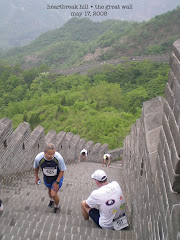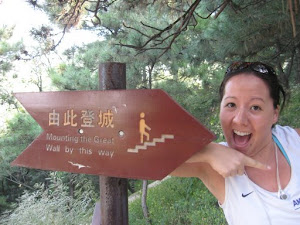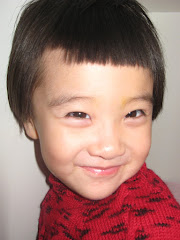Hi Everyone:
Transitions Abroad has posted the wining essays online (I really enjoyed reading all the essays and I think you will too). Understandably mine has been edited and since it is a bit different, I'm also posting the original below. Papa Rhodes says the latter sounds most like me as my excitement comes across more. Mama Rhodes likes how they added headings and says it seems more concise. Sibling Rhodes says, "Hey, you're published and they gave you money so no worries!" hahaha. All in the family. Here is the link:
transitionsabroad.com/information/writers/expatriate_writing_contest.shtml
"One World, One Dream":
Buildings Rise and Expectations Soar For A Chinese City's Unveiling
Megan Rhodes
Droplets of beer slid down his glasses. I wiped off my cheeks with my beer-soaked sweater and slowly set my empty glass on the table. Now what I wanted to douse him in were my apologies. My sister’s boss had taken us to dinner. In China, when toasting people you respect, you make sure your glass is lower than theirs. My earnest attempts to ensure my glass was lower than his were matched by his efforts to put his glass lower than mine. Like racing down a ladder, we each tried to out-lower the other until both of our drinks splashed out of our glasses. There was nothing left to toast with but laughter.
It's been five months since we moved to Beijing, and we’re still discovering ways to adjust and integrate into cultural mores. "Guan xi", the relationships between people, drives China because it's the most populated place on earth. I am discovering this feeling of interconnectedness can exist between foreigners and Chinese, even if you are like me and have very few words in your Chinese arsenal.
The uniformed man who flags down the buses at the bus stop always greets me with a huge smile and energetic wave. He still compliments my first four words of Chinese I spoke to him, "Is this bus 628?" Yesterday, he told me he doesn't know any English aside from "very good". I taught him how to say "bus", "taxi", "car", and "truck". He said something in Chinese I couldn't quite understand. Then he switched to English, and said, "One world, one dream". This is the Olympic slogan on many billboards around Beijing. Although he said he didn't know how to speak English, he knew how to say this phrase. He taught me how to say it in Chinese. His English was so much better than my Chinese attempt. The line of people behind us craned their necks in interest. We both said it together in the other's language until my bus came. I jumped on, waving him goodbye as he smiled waving his red flag.
These sort of exchanges happen often, with street vendors, cab drivers, and waitresses. It's a nice addition to daily life that wouldn't happen back home in the states. A pair of 26 and 22 year old girls with lofty ideas and passionate natures, my sister Caitlin and I spent the last 21 years living with our parents in a solar-envelope house, tucked away in the tiny, woodsy New Hampshire town of Sharon (population 351 people). We moved here without a job lined up or a placed to live nailed down. We used Marriott hotel points from my previous job for our first week. My sister networked an American contact into reporting for Sports Illustrated China. Upon arriving I secured an interview for teaching English at a bilingual international kindergarten. Not only are my students amazingly lovable, but they are also incredibly bright. At three years old, my class already knows how to sing the national anthem and converses in two or three languages.
I am just one of countless foreigners teaching English in China. In fact, when meeting a fellow Western ex-patriot, he or she will ask, "What are you doing in China, teaching English?" People who are native English speakers with a college degree are guaranteed work as the demand for learning English is so high. The Chinese government is encouraging everyone to learn, including mandatory lessons for taxi cab drivers in preparation for the Olympics.
Olympic countdown clocks adorn restaurants, shops, and classrooms. Nationalistic energy electrifies Beijing as it anticipates the world's spotlight. The world's eyes turn to China. Buildings rise and expectations soar. Construction sites litter the landscape. My sister and I marvel at the progress we've seen since arriving here. Sky rises tower as high as Chinese hopes for their city's successful unveiling. I love experiencing every day life: the elderly doing taichi together with swords, (early in the morning, even when it's zero degrees) and the blinking bike symbols on traffic lights. The old men who walk their birds. The smells of warmed yams and grilled, steamed corn that street vendors sell wafts throughout the city.
As a food zealot, you don't need a lot of money to enjoy the panoply of eats Beijing offers. I consider myself a street food connoisseur of sorts. Peppered throughout the city, you can buy everything from baozi (a rounder dumping but the dough is thicker, fluffier, almost bread-like) to jian bing, delicious crepes they make for you on the spot. I eat one almost every day. They break an egg over the crepe and as it cooks they add a thin, fried, crispy square in the middle. Sauce, spices, chives, and onions are added and then the crepe is folded around the square. When my sister and I first arrived, we went on what we referred to as our "Street Scurvy Diet." If you were fried, a carbohydrate, and sold by a street vendor, we ate you. We joke about starting a new diet revolution in the states, because after about a week we both looked at each other and realized, "You’re smaller!” But soon my sister and I expanded into restaurants, realizing that waiters and waitresses are not tipped (tipping generally doesn't happen here) and tea is often free. In finding a good restaurant, you can eat well without spending much.
You can also experience what Westerners deem as exotic eats. There's a famous snack street in Wangfujing illuminated at night by strings of red lanterns. The street is almost as pretty as the wild and wonderful food that the vendors wave in front of you as they yell out their exotic names. Almost everything is speared on sticks, from fruit and dumplings to seahorses and starfish. (I don't recommend the latter as the meat was hard to eat, bitter and crunchy.) On another occasion, we ate dog. It's the sweetest tasting, most guilt-provoking meat I have tried. It does not taste like chicken. But I am always grateful for any opportunity to experience Chinese cuisine.
Another dimension of Chinese culture I’m practicing is how to give and receive gifts. It’s customary for Chinese to not accept a gift the first three times it is offered. When one of my student’s parents gave me and the Chinese teacher chocolates, I forgot and immediately took the ribboned-box. Then I watched as the Chinese teacher politely refused: “No, no, no, I couldn’t, I couldn’t….” Again. And then again. After her third-round she accepted graciously as I stood awkwardly next to her feeling like the greedy chocolate lover that I am.
As we excitedly plunge into Chinese society, sometimes we feel like we can only dive in so far. With so many people living here with proportionately few foreigners, not being Chinese makes you an instant point of focus. Sometimes we enter a bustling restaurant and upon our entrance, everyone stops mid-sentence, freezes with chopsticks mid-way to mouths, and stares at us. At other times, people will politely ask which country we’re from and why we’re in China. The “stare downs,” as I used to call them, occur daily--on the subway, at the grocery store, walking down the sidewalk. The other day I was walking along and a smiling man ran up to me, then hovered a bit awkwardly. His friend then turned around in front of us and took our picture. They took another one and then with huge smiles ran away as quickly as they came. There have been a few camera ambushes. While these sort of occurrences can take some getting used to, we understand it is simply rooted in curiosity. In fact, when we first arrived, we found ourselves doing the same thing: "Look! It’s another foreigner over there!"
But regardless of foreign or native status, we all are united in trying to stay positive about the air. Can you imagine wearing a mask every time you go outside? Many people do that here, and my sister and I have both battled respiratory track infections. The sight of a black tissue after blowing my nose startled me at first. A marathon runner, I miss running outside. My sister read that running outside on a high smog day is equivalent to smoking a pack of cigarettes. Recently The New York Times cited research that pollution levels on a typical day in Beijing are nearly five times above World Health Organization standards for safety.
Still this comes with the territory of being one of the most populated places on earth. The highways here have 15 jam-packed lanes. Uniformed subway and bus officials push people onto the trains and buses already crammed tightly with people. I remember being shoved and heaved onto the bus for the first time---do I say "Thank you?" With hoards and hoards of people waiting to get onto buses and trains, people sometimes become impatient (I was pulled off the train once by an eager to board passenger). But in context, this is understandable as almost 2.5 million people use public transit every day. I am now accustomed to the inevitable cuddling with strangers as we stand entangled in understanding, arms squished onto each other's chests, heads pressed on each other's backs.
Such challenges, however, are part of the adventure. There is something about China, almost an intangible, magical mysticism about this culture and its people that makes being stimulated in this way part of the ride. As the weeks go by I notice the "stare downs" less and recognize the songs on the radio more. I continue to make more friends with the Yam Men and The Corn Ladies--"I missed you yesterday!" I no longer miss some material things hard to come by here: clothes dryers, dishwashers, paper towels or Ziploc bags. Seeing other foreigners doesn't elicit as much of a reaction anymore. Although friendly, knowing smiles are sometimes exchanged in passing. My immunity is stronger now as we acclimate to the air. Though my Chinese is still in the baby steps stage, I can ask for the bill without first being shown to the bathroom or given a pile of napkins. Even though my Chinese elicits giggles from my three year-olds, I've found many Chinese are quick to compliment foreigners stammered, sputtering attempts--often praising how wonderfully you said hello.
Almost six months ago, we took a leap of faith and relocated to the other side of the world. And you can’t jump that far without an open mind. Or emptying a toasting glass.
http://www.thebeijinger.com/ is an invaluable resource for ex-patriots for acclimating into Beijing life. Every foreigner I know uses it regularly. From finding jobs to looking for apartments, it's like the Craigslist of Beijing. (There is, in fact, a Beijing Craigslist, but I find "The Beijinger" is more widely used and extensive). For example, when I was looking for a Chinese tutor, I posted on "The Beginner" and by that evening my post was viewed by over 100 people and my mailbox was brimming with replies.
http://www.cityweekend.com.cn/beijing/ is another rich database of user recommended night spots, places to shop and visit. Both websites have accompanying magazines that you can get for free at coffee shops or bookstores.
Eleanor Roosevelt said: "You must do the things you think you cannot do." For me, that's learning Chinese. A tonal language, many characters are pronounced the same but tones differentiate meaning. Incorrect tones could result in calling your mom a horse or your dad the number eight. http://chinesepod.com/ helps you practice your tones. It has almost 800 lessons and offers free daily pod casts, dialogues, exercises, and lesson review--ranging from elementary to the Super Bowl. Also, http://www.dict.cn/ is a terrific online dictionary that gives several examples with many useful phrases.
http://mobilenative.com/sms_help.php is like calling information in China for free. It sends free texts to your phone in both Chinese and/or English. If you are craving pizza, for instance, type that word into their search engine and lists of pizza places in Beijing appear, complete with addresses and phone numbers. Click on one of the options and a satellite view gives you a visual location as well.
Immersion Guides Mandarin Phrasebook is a phrasebook that covers everything from how to negotiate and sign a lease, to how to bargain and how to get a good hair cut. With essential phrases as well as Beijing slang, it's incredibly informative, easy to use, and funny (learn how to say: "I don't want a mullet!"). My sister and I each bought one and neither of us ever leave home without it.






















.jpg)










































